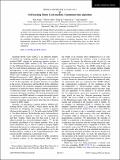Self-learning Monte Carlo method: Continuous-time algorithm
Author(s)
Nagai, Yuki; Shen, Huitao; Qi, Yang; Liu, Junwei; Fu, Liang
DownloadPhysRevB.96.161102.pdf (308.6Kb)
PUBLISHER_POLICY
Publisher Policy
Article is made available in accordance with the publisher's policy and may be subject to US copyright law. Please refer to the publisher's site for terms of use.
Terms of use
Metadata
Show full item recordAbstract
The recently introduced self-learning Monte Carlo method is a general-purpose numerical method that speeds up Monte Carlo simulations by training an effective model to propose uncorrelated configurations in the Markov chain. We implement this method in the framework of a continuous-time Monte Carlo method with an auxiliary field in quantum impurity models. We introduce and train a diagram generating function (DGF) to model the probability distribution of auxiliary field configurations in continuous imaginary time, at all orders of diagrammatic expansion. By using DGF to propose global moves in configuration space, we show that the self-learning continuous-time Monte Carlo method can significantly reduce the computational complexity of the simulation.
Date issued
2017-10Department
Massachusetts Institute of Technology. Department of PhysicsJournal
Physical Review B
Publisher
American Physical Society
Citation
Nagai, Yuki et al. "Self-learning Monte Carlo method: Continuous-time algorithm." Physical Review B 96, 16 (October 2017): 161102(R) © 2017 American Physical Society
Version: Final published version
ISSN
2469-9950
2469-9969